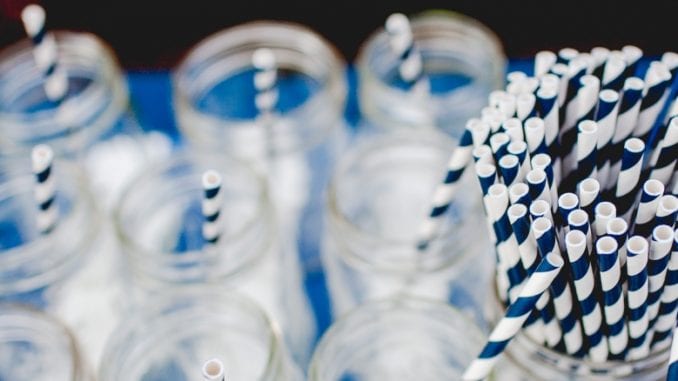
As more and more cafés consider banning plastic straws, some are calling the ban discriminatory against disabled communities.
BY ASHLEY RODRIGUEZ
BARISTA MAGAZINE ONLINE
In the August + September 2018 issue of Barista Magazine, writer Jess Dunkin talks about alternatives to plastic straws in the café. They talk to cafes all across the nation, like Chicago’s Backlot Coffee, Red Buffalo Coffee in Silverthorne, Colo., and Joe Coffee, a group of 18 stores across New York City and Philadelphia, that have banned or reduced their use of plastic straws, and provide an in-depth pro/con analysis of plastic alternatives such as bamboo, silicone, metal, and paper. The article is part one of a two-part series on reducing waste within coffee shops.
The problem of plastic straws isn’t just a café-specific issue; a number of cities’ municipalities, like Seattle, Davis, Calif., and most recently San Francisco, have passed ordinances that either ban or severely limit single-use plastic straws. The movement to ban or limit single-use plastic straws likely stemmed from a viral video of a turtle having a plastic straw removed from its nose in 2015, and has inspired a worldwide movement; Scotland plans to ban all plastic straws by 2019, and Taiwan has a plan to eliminate all single-use plastic items by 2030. You can type the hashtags #TheLastStraw, #StopSucking, or #SheddtheStraw (the last hashtag was started by Shedd Aquarium in Chicago) on Twitter to see a list of supporters advocating for this small step toward reducing public consumption of disposable goods.
The article also points out that outright banning straws may disproportionally affect disabled communities. While options like glass or metal straws may be appropriate for dining in, it is difficult to use these options when taking a drink to go (which for many coffee shops is the majority of business). Paper straws, if available, disintegrate easily, and taking a drink to go means you need to have a metal or glass straw that isn’t dirty ready to go (along with the dangers of temperature if it’s hot outside or if you order a hot drink).
Disabled activists have likewise been vocal on social media about how the straw ban is potentially ableist, and makes navigating a world designed for able-bodied people even more difficult. In her article for Eater, “Why Disabled People Need Plastic Straws,” Alice Wong, founder and director of the Disability Visibility Project, lists the number of reasons why a strict straw ban puts a target on disabled communities; for many folks, plastic straws are the only way for them to drink beverages safely, and while they may be considered a frivolous add-on to a drink for abled-bodied folks, they are a necessity for others. “Plastic straws are considered unnecessary items used by environmentalists as a ‘gateway plastic’ to engage the public on a larger conversation about waste … But one person’s social prop is another person’s conduit for nutrition. It’s as if people who rely on straws—older adults, children, and disabled people—don’t matter and that our needs are less important than the environment. I feel erased by these attitudes,” Alice writes.
Alice mentions that her vocalness—and the voices of others—about needing straws has received backlash from zero-waste activists. “People have told me online that I still have access to biodegradable straws at Starbucks, despite my reasons for using plastic ones. People have told me to bring my own reusable straws without thinking about the extra work that entails. Why would a disabled customer have to bring something in order to drink while non-disabled people have the convenience and ability to use what is provided for free? This is neither just, equitable, nor hospitable.” As activists like Alice and other advocates for the disabled have noted, banning straws puts an undue burden on disabled people; not only are they being denied an experience that is freely available to able-bodied people, but they are being asked to work harder to enjoy the same basic experiences.
In all this debate, one thing remains clear: Disabled activists aren’t trying to harm the environment or tell everyone they should use plastic straws—they’re merely advocating for their own humanity. “If cafés can offer four types of milk for espresso drinks and restaurants 50 types of wine and beer, small businesses and large corporations can manage offering two types of straws,” Alice writes. She then offers solutions for cafés that want to reduce their straw usage, like freely offering two different straw options that are clearly labeled (keeping plastic straws as a “by request” option can be othering, subject disabled folks to discrimination, and can be especially difficult for those who don’t have visible disabilities who might receive unwanted questions and scrutiny) or rethinking waste in other areas of the café, like to-go cups, plastic wrap, or other items.
If an individual or a café truly wants to reduce waste, there are a number of creative ways that don’t involve alienating and dismissing the needs of a marginalized group of people. Reducing straws will help, but it’s up to able-bodied people—the people who do not need straws—to regulate themselves and opt toward more environmentally friendly drinking options.


